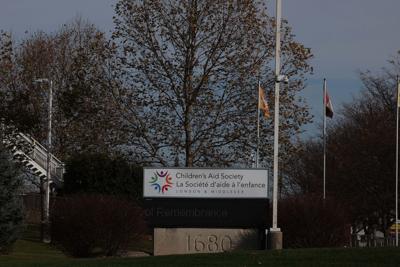Ontario is spending millions of dollars a year to warehouse vulnerable kids in hotels, shelters and other unlicensed settings that child welfare agencies are turning to amid a provincewide shortage of treatment options for kids with complex health needs.
The use of these placements has soared over the past three years, according to a leaked internal report obtained by the ╔ź╔ź└▓ Star, putting unprecedented strain on childrenÔÇÖs aid societies and leaving many kids in unstable or dangerous living arrangements where they are being contained rather than treated.
The confidential report was prepared by the Ontario Association of ChildrenÔÇÖs Aid Societies and shared with the government in early July. It reveals that provincially funded childrenÔÇÖs aid societies are on average spending more than $1,000-a-day to house and supervise a single child or youth in an unlicensed placement, up dramatically from an average $400-a-day two years earlier.
Child welfare agencies have reported spending close to $1 million per year on a single child, often just for housing and round-the-clock supervision ÔÇö money that advocates, families and child welfare workers say would be better spent on treatment and social services.
ÔÇťThese kids are being warehoused while we look for something better,ÔÇŁ said Arlette Carrier, a veteran child protection worker and CUPE union president representing CAS workers in Lanark, Leeds and Grenville counties, west of Ottawa. ÔÇťThey need treatment thatÔÇÖs not available. WeÔÇÖre looking far and wide, and itÔÇÖs not there, or we find something and it doesnÔÇÖt work out and then weÔÇÖre back to square one.ÔÇŁ
In the fiscal year ending in March 2024, child welfare agencies spent $43.5 million on housing and supervision for these kids, a more than sevenfold increase from $5.6 million spent two years earlier, said the report, which included survey findings from 39 childrenÔÇÖs aid societies.
The report by the OACAS, which represents most of OntarioÔÇÖs child welfare organizations, warned that agencies are struggling to secure mental health, developmental and culturally relevant services, especially for Indigenous children and youth, and stressed the need for the province to create more specialized and intensive treatment options.
The report shows the number of children under 18 housed in unlicensed placements nearly tripled during a three-year period ending in March 2024, rising from 124 kids to 339.
As hundreds more children end up in unlicensed settings, the cost of those placements is rising. Inflation, increased demand and higher fees charged by private agencies have contributed to the increase, according to the OACAS.
In Ontario, the government licenses residential care for children and youth but also permits the use of unlicensed placements. The OACAS report says that an unlicensed placement may sometimes be the best option for a child, such as when a teen with unique developmental needs is placed in a home meant for adults. But agencies are increasingly using them ÔÇťout of necessity rather than choice,ÔÇŁ the report warns.
The situation has become so desperate that some child welfare agencies have been forced to house children in hotels, office buildings and camping trailers.
ÔÇťThese placements put them at significant risk,ÔÇŁ said Carolyn Cafik, a child protection worker and CUPE union president in southwestern Ontario, speaking on behalf of the unionized staff at Bruce Grey Child and Family Services.
The unstable living environments expose kids to criminal activity, drugs, human trafficking and homelessness, she said. ÔÇťTheyÔÇÖre already struggling with their sense of belonging and wanting to fit into the world.ÔÇŁ Often, this puts them ÔÇťright into the clutches of dangerous people.ÔÇŁ
Premier Doug Ford ordered an audit of OntarioÔÇÖs child welfare agencies last fall, alleging misuse of taxpayer dollars, a move advocates and child protection workers called a ÔÇťsmokescreenÔÇŁ to detract from the provinceÔÇÖs failure to fix long-standing problems. The ministry in charge of child welfare said the third-party audit is underway.
The ministry of children, community and social services said in a statement that the government is taking new measures to improve safety, including a requirement that childrenÔÇÖs aid societies must schedule a visit with each child in their care ÔÇťat least once every 30 days, compared to the previous 90-day requirement.ÔÇŁ A ministry spokesperson did not respond directly to questions about the cost of unlicensed placements and said officials are reviewing the OACAS report. Minister Michael Parsa has declined multiple interview requests over the past month.
Ontario Ombudsman Paul Dub├ę is investigating the housing of kids in hotels, rental apartments and office buildings, saying the practice raised serious concerns about safety, privacy and comfort. A final report is expected later this year.
Many children who end up in high-cost unlicensed placements are coming into the care of childrenÔÇÖs aid societies not because of traditional child protection concerns such as abuse or neglect, but because their parents reach a breaking point after struggling to get appropriate medical care and supports, and can no longer safely care for them at home.
ChildrenÔÇÖs aid societies have housed hundreds of kids, including many with mental health conditions and high-risk behaviours, in unlicensed settings.
ChildrenÔÇÖs aid societies have housed hundreds of kids, including many with mental health conditions and high-risk behaviours, in unlicensed settings.
The Star has spoken to nearly a dozen families who made the difficult decision to relinquish care to CAS, including the parents of 15-year-old Jade, who died last fall in London after living in hotels for a year. Most parents stressed they could have kept their child at home with more support and said that doing so would have saved the province money in the long run.
One mother in London, Ont. had to surrender care of her 12-year-old to the ChildrenÔÇÖs Aid Society of London and Middlesex in 2022 after the child was repeatedly hospitalized for self-harm and police were called for numerous violent outbursts.
The mother, Ang, said that when her child was in crisis at home, the province offered the family six hours of paid caregiving support a week. But when the child was hospitalized or with CAS, they were given three paid caregivers at a time, around the clock.
ÔÇťIf a facility needs three trained staff to care for my child, how am I supposed to do that at home alone?ÔÇŁ said Ang, whose adopted child, now 15, has Fetal Alcohol Spectrum Disorder, a developmental disability that can impact memory, attention and emotional regulation. The Star is withholding the motherÔÇÖs full name because the teen cannot be identified under the Child and Youth Family Services Act.
It took nearly a year for the teen to get a licensed placement at a treatment centre, during which they lived in a hospital and, for 10 days, in the London CAS office building.
ÔÇťThe province spent millions being reactive instead of proactive,ÔÇŁ Ang said. ÔÇťAnd most of it was to house my child, not to actually treat my child.ÔÇŁ
The OACAS has been warning the province about the growing number of kids with complex needs coming into care since at least 2020, according to documents reviewed by the Star. In the confidential report, the association says that more services, including respite care, mental health and substance use supports, would in many cases prevent child welfare agencies getting involved in the first place.
Carrier, who has worked in child protection for 30 years at childrenÔÇÖs aid societies and Indigenous child well-being agencies across Ontario, has seen the impact the placement crisis has had on children whose needs arenÔÇÖt being met.
ÔÇťWeÔÇÖre losing a generation of kids and we feel powerless to effect any change in their lives,ÔÇŁ Carrier said. ÔÇťItÔÇÖs demoralizing to be part of a system thatÔÇÖs failing them.ÔÇŁ
Correction: An earlier version of this story said a child was housed in the basement of the London CAS office building. London CAS has since clarified that it was a windowless room on the buildingÔÇÖs main floor.






























To join the conversation set a first and last name in your user profile.
Sign in or register for free to join the Conversation